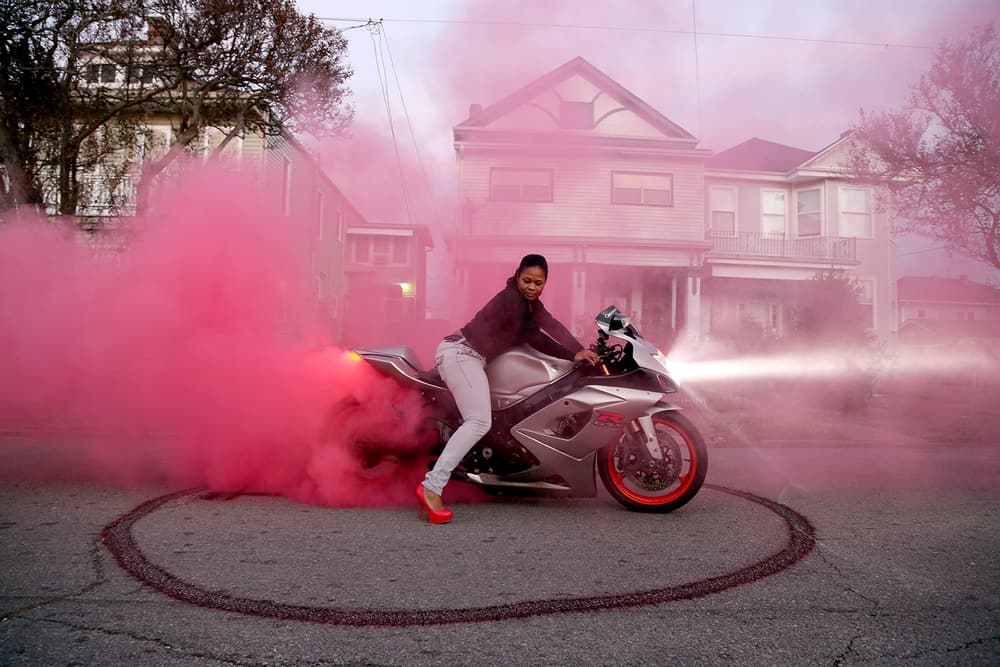Interview 065 • May 23rd 2018
- Interview by Lou Noble, Portraits of Akasha Rabut by Kate Sweeney
About Akasha Rabut at the Vans Vision Walk
Akasha Rabut is a photographer based in New Orleans, La. She has a BFA in photography from the San Francisco Art Institute. Akasha's clients include The FADER, Nike, Bloomberg Businessweek, Vogue, INC. Magazine, BUST Magazine, ESPN The Magazine, Budweiser and rapper J. Cole.
Links
Foreword
Being an outsider has a certain advantage as an artist. The beauty in the "ordinary" pops. Items a local might dismiss as everyday draw your eye. With some time, you appreciate the quirks that make a location special. There are downsides, sure – but you stay in a location long enough, you become a hybrid. Are you a true local? Nah. But the new location sneaks up on you at some point and becomes "home." Akasha Rabut bridges that gap, highlighting the New Orleans culture she has fallen in love with, while wary of being authentic to her new home.
This interview has been edited for clarity and content.
Interview
What is it that draws you to the culture here, to photograph the culture here in New Orleans?
Hm…
We ask the tough questions here.
I like that! That’s good. I grew up in California and Hawaii, and I never experienced culture the way I’ve experienced it here. The city is like a cradle for culture, and there’s just so many luminaries here.
Especially because there’s a lot of black culture here.
Yeah, but I think I’ve never…growing up in Hawaii, there aren’t really any black people there. And I lived in southern California, which is pretty segregated, so coming here and being exposed to it has been really enlightening. I didn’t realize that racism still existed, you know. In California, you know, we’re kind of in a bubble. Coming down here, I’ve seen that and it’s, I don’t know, this is the northern most Caribbean city, there’s just so much history here and so much culture that, yeah, I feel like the city is exploding with it. It’s everywhere, and I love it.
What is it that you’re focused on conveying when you’re photographing?
I feel like I’m trying, I like to come from more of an ethnographic perspective. And I just kind of want to share what’s happening, and the city. You know, I’m really torn by where I want my images to be, and if I’m the right person to be doing this, I battle with this all the time. Who am I, I’m like a transplant, I’m not from here.
Right.
Why do I get to take these photos of these people, and I really don’t want to be exploitative, I want to really nourish the people here and help that culture live on. When I first started doing it, it felt more like I was capturing these beautiful moments and instilling them in history. Maybe the romantic side of me is like, “oh, I’ll just put them under my bed and one day someone will find them.” But this day and age, I also needed to make money. There are certain people who want my images and yeah, it’s become this funny thing, because luckily I’m in a place where I can be really selective over my legacy, I really don’t want to sell to commodify the culture here, I really want to just give back to the people I’m photographing, so that’s a big part of it.
I’m really interested in finding out who these people are. If they’re letting me take their photo, I’m going to get them prints and then I also offer to shoot their weddings or senior portraits, or whatever I can, to make it more of a symbiotic relationship. It’s a strange thing to be in the position that I’m ion, because I’m shooting the street culture, I’m out on the streets, and this is the stuff that I’m seeing in New Orleans happen, I’m not staging it. I’m just immersed in it. I really want people to see the beautiful culture that happens in New Orleans, it’s a celebration.
Was this the kind of photography career you wanted when you were first studying?
When I started studying photography, I was really into documentary, and I have this mentor who mentored me all through college, her name is Darcy Padilla, and also Frank Espada, they’re documentary photographers, so I was really into documentary, and then for some reason I got really into fashion photography, which was also because I’m in huge debt from going to art school, so I kind of dabbled in that, and I’m really bad at it, and I think that’s why I kept trying to do it, because I was like, “I’m going to be good at it.” And it didn’t feel good, taking those types of photos, I just felt like I was mimicking other photographers, and it felt…


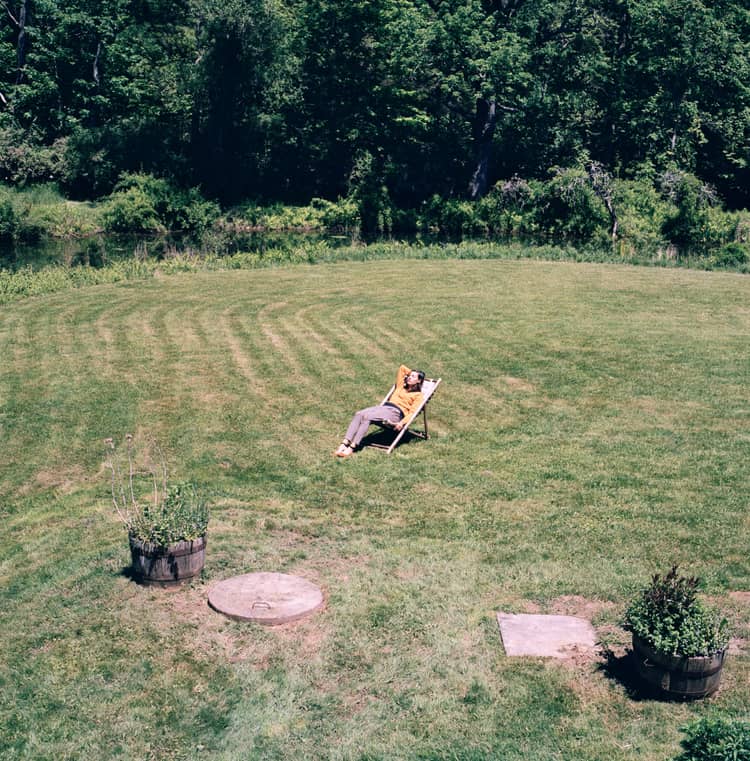

It wasn’t your voice.
Yeah, it didn’t feel like it was my voice, and I just kind of fell into…my ex-partner is so in love with street culture and he opened my eyes up to the culture that was here, and it’s like once the veil was lifted, I was just like “oh my gosh, this is so beautiful.” And so I started hanging out at second lines, meeting people, and I love interacting with people and getting a slice of their life and telling stories, and I think I’m at this age where relationships and human experiences are so important to me. So yeah, that’s kind of how I got to it, I just love interacting with people, and I feel like this talent that I have is a gift and I really want to share it with people. I mean, New Orleans, it’s a pretty poor place, and a lot of people don’t get to have photos of themselves. And because we’re in a digital age, a lot of people don’t get tangible photos of themselves.
Right.
So that’s really important to me, gifting somebody a print of themselves, or them getting to see themselves in a publication or in a platform, and they feel really special about it. That’s also important to me.
You shoot exclusively with film, why is it you’re drawn to shoot just film?
There’s a number of reasons. I am a Luddite, and I hate computers, I can’t stand them, so I don’t want to sit in front of a computer for hours, and with digital it’s really easy to take 5,000 photos and then I’m committed to sifting through 5,000 photos, so with film, I get 10 images per roll. And I also feel like it’s a lot more intimate, I get to really kind of talk to people, and it’s a very slow process, and I feel like that helps me to get to know people. And yeah, it also looks beautiful, when I was in college it was just at the time when everything was shifting into digital, and I fought, and I shouldn’t have. I probably should have just absorbed it and learned how to do it, but I fought it and I was the only person in my class who was shooting film. I love the process…I’m really stubborn. Digital is beautiful, I just don’t think it compares to film, and I think film is just, there’s something so raw and crispy about it. I understand how to manipulate light and manipulate film, and I don’t understand how to do it with a digital camera, or maybe I just don’t like it.
When I first learned how to do photography, I was in a black and white dark room, so I love that part of it, I don’t get to do that anymore, but just having something tangible feels so much better than having a digital camera. It just doesn’t feel comfortable looking through, I feel like whenever I shoot digital I’m constantly obsessing, I’ve got to look at it right now, and with film, when I take a shot I know that that shot is the shot I want to take, you know, not just clicking away for the sake of clicking away. So I think that’s why I shoot film, I also think the glass on my camera is so magnificent, more than any other glass.

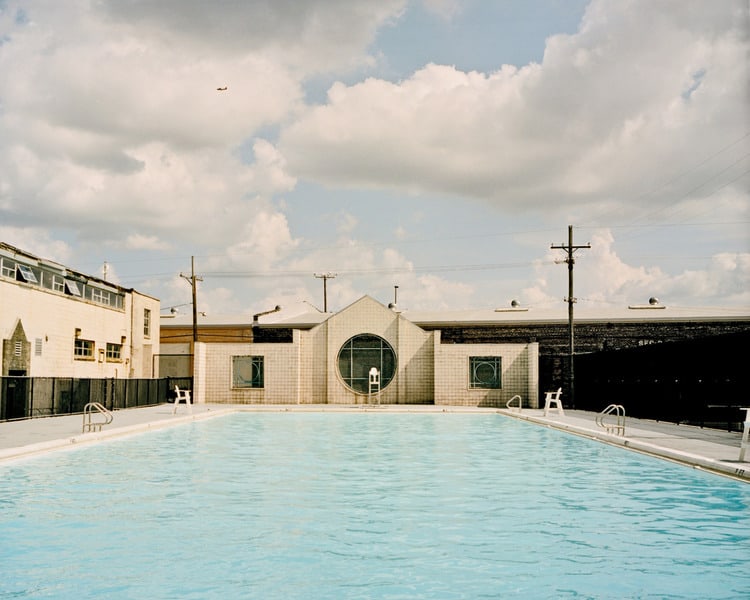

Do you find that when you’re shooting, you’re very aware of the camera? Or the way you work, do you feel like the camera becomes invisible?
I feel like the camera becomes invisible, yeah. Because my camera is really heavy, it’s probably like twelve pounds, it requires a lot of attention, it’s constantly breaking, but I think I just kind of forget that it’s there and really just, I feel like it’s an extension of my brain or something, it’s just this thing in my face, and these photos happen.
This is something we ask everyone, do you prefer the process or the result?
Oh, I…that’s a really cool question.
No softballs.
I love the process, the process is so fun to me because I get to hang out with people that I probably wouldn’t otherwise. I feel like if I didn’t have a camera, they’d be like, “who’s this weirdo who’s trying to talk to me right now??” Usually because I have the camera, they’ll talk to me, so the process is cool, getting to talk to people about photography, everybody is always excited to talk about my camera because it looks so weird. But yeah, the process of learning about people, and their stories that they want to share is really really fun, and then the result is really, it feels so good. I was telling somebody earlier, I was shooting in Bywater, and this man, he was probably in his fifties, he came out of his house and he was decked out. He had a blue striped shirt with blue pants, he had three blue bandanas around his neck and head, and was wearing blue shoes. He just looked so flossed out, looked so good, and I started talking to him, and he was like, “you want to come in my house?” So I was like, “yes I want to go in your house!” And I feel like normally that wouldn’t happen, like to any normal person, and then we go in and his living room is floor-to-ceiling aquariums, there’s all these aquariums full of fish, and he turns out to be a Mardi Gras Indian chief, so he’s got this whole room with all his Mardi Gras Indian stuff. And his wife is just laying in bed, like okay.
You photographed all of it, right!?
I didn’t photograph that, no. This is another funny part, to me. There’s certain things that I will photograph and there’s other things that I’m like, “I’m just going to let this organic experience happen and get to know him.” He was like, “come back, sometime!” I took a photo of him outside, I’m going to bring him his print, and when I get back I’ll probably get to make more photos with him, but this time, no, I didn’t photograph any of it, I just was talking to him, and I felt like that was meant to be. He wanted me to come in for some reason, and his wife was like, “you want a ticket to Jazz Fest?” It was just this really cool night. It feels so good to have that experience, so that’s the process that I love. And then the result, when I see my photos, I’m always, I can’t explain, it’s like I’m falling in love or something, it’s such a cool feeling to see something and think, “oh yes, I remember what that was like when I took that photo, and now I’m here with it, and I get to remember what it was like every time I look at this image.” So I think all of it is worth it.
Have you always had this interest in people? Was your love for documentary based around people and their stories or…?
I don’t know what it was…I started taking photos when I was in high school, when I was a sophomore, and when I first started taking photos it was of people. So there must be an interest in people that’s always been there. I think I’m interested in people, I also love the way people look, so there’s that part of it, everybody is so, looks so different, yeah, I think it’s the people.

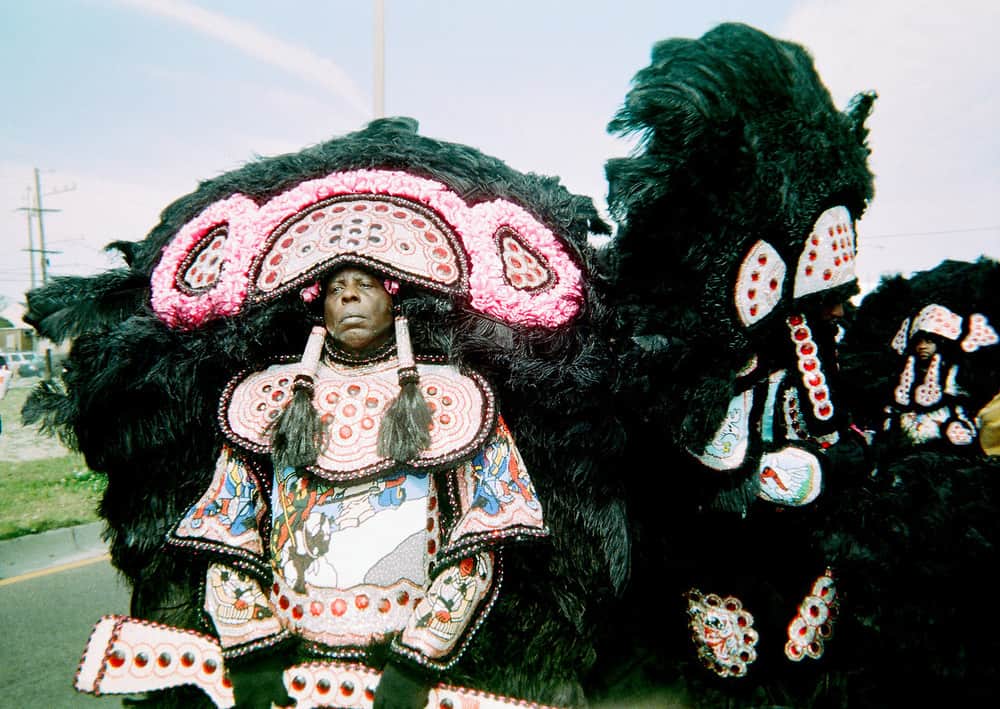

Were there photographers you wanted to emulate in terms of the career, work/art?
Yeah, I mean I think my professor in college, Darcy Padilla… I crushed on her so hard, I was like, “oh my gosh, her work is so beautiful and so meaningful.”
Where did you go to school?
I went to the San Francisco Art Institute. She has a project…it was a 20 year-long project that she worked on with this woman that she met in one of the hotels in the tenderloin of San Francisco, and this woman had several children and I think she ended up dying of AIDS. It was a 20 year-long process of Darcy spending all this time with her. I feel like, to me, when I met her, I knew her work before I met her, and then serendipitously she ended up being this professor at the school I decided to go to. I think, yeah, she was the business. I was like, I love this woman, I love her work, so I definitely think of college as, I want to be like her, and same with Frank Espada, he was another great documentarian, he photographed Malcolm X, he was just such a lone wolf and inside his head. So I feel like yeah, he definitely had an influence on me. There’s really famous people like Martin Parr that I really love, I think his work is so hilarious and beautiful, and sad. There’s so many emotions in his work that I feel that I can relate to, so yeah, there’s a lot of people.
Are there other places you want to go in your photography you feel you haven’t gone yet?
Definitely, yeah.
You talk about the humor and sadness, your work right now seems very kind of celebratory.
Yeah.
It doesn’t really play around in those places.
Yeah, I think I’ve been moving more into the comedic side of things, I want to make more intelligent photographs where you’re like, “oh yeah there’s so much happening, and there’s a joke or something in it, yeah.” So I want to move into that direction, I don’t know how I’m going to do that.

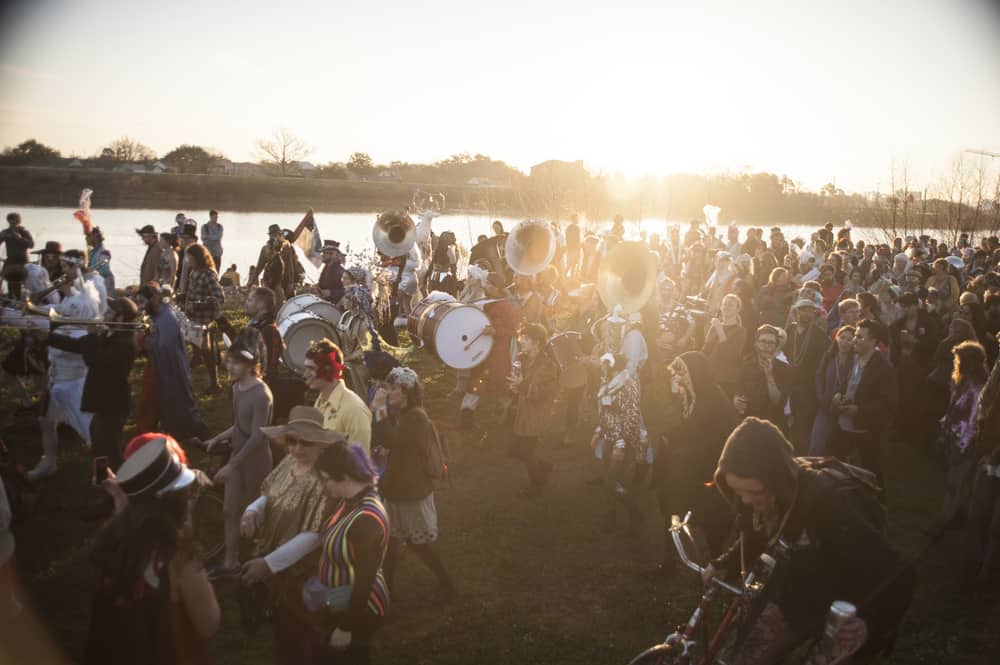

Do you feel like there’s an end-point in terms of photographing New Orleans culture? Street culture, black culture, are there other kind of subcultures that you’re interested in, that you haven’t approached yet?
Yeah, I don’t know. I’m still very much in this weird headspace of “should I be photographing these people?” I was telling Olivia Bee earlier, I started this educational program where I teach high school kids how to do street photography, because they are the best people to be telling the story because they’re from here, they need to go out. So that’s super-important to me. I don’t know what my next project is going to be. I’ve been really lucky, people love the body of work that I have right now, I have this one about an all female motorcycle gang called Caramel Curves, and then Southern Riderz. And New Orleans, an ongoing project, that stuff, New Orleans, an ongoing project is probably going to go on forever, I think, for ever and ever until the city is underwater. So that is something that I’m going to continue working on, but I don’t know about new projects in New Orleans, I don’t know what I’m going to work on next.
I’m really interested in Detroit, and I really want to do a project in Detroit. I’ve spent some time up there and I just, it’s such a fascinating city, and it’s such a shell of a city right now, but there are still people that are living there, and when I go up there, a lot of people are like, “I don’t really know the history of this place,” and I haven’t seen that much work come out of Detroit, so I’m really interested in that.
Is permission part of your practice? Do you photograph people maybe who don’t know they’re being photographed, or is that something you consider?
Permission is a really important thing to me. It feels right, then I’ll do it without permission if it feels like the person is open to it.
Right.
But most of the time I like to ask people, I don’t want to take someone’s photo if they don’t want me to take their photo. I feel like photography, that’s such a sacred thing, and the way that everybody is a photographer these days, everybody has their cell phone out and is taking photos, it just doesn’t, I don’t know, I don’t like being that invasive with people, and I know a lot of people are probably used to it, but I definitely like to ask people. And I feel like that’s a part of my process, too, talking to somebody andgauging who they are, and then taking the photo of them.

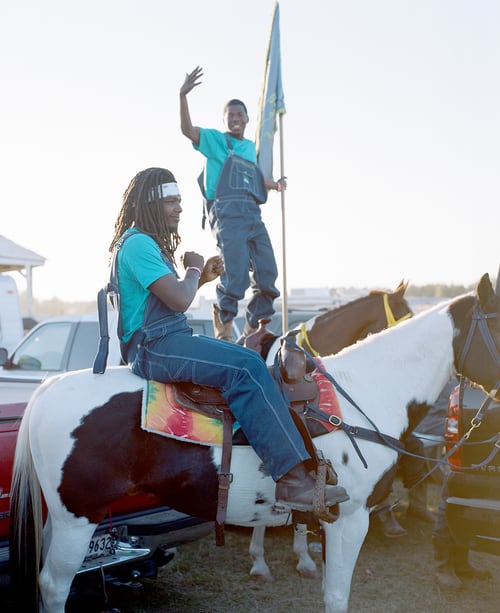


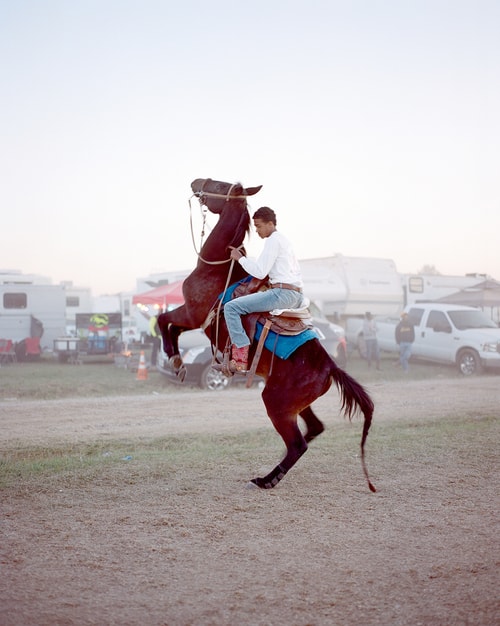

Something that occurred to me: when you’re shooting people, are you trying to capture something they want to give, or are you trying to get them to give something that perhaps they’re not intending to reveal?
It goes back and forth, I think it waffles back and forth. There are times when somebody gives me something, they’re totally chill and I’m like, “can I take your photo?” And then they give me this…this gift, like whoa, I wasn’t expecting that, but this just made a cool photo. And then there’s other times when I think it’s really challenging and I’m trying to pull something out of somebody and sometimes I get it, sometimes I don’t.
Do you have a routine you use on people?
I don’t really have a routine, I usually just start talking to the person, but I don’t really have a routine. When I’m on the streets, I’m drawn to something because it’s so beautiful, there’s something about it that’s really striking to me, or visually stunning. And then I usually, if somebody has a snake, I’ll start talking about their snake. If it’s somebody wearing a really cool outfit, I’ll talk to them about that; I usually end up complimenting somebody on something, I’m really obsessed with patterns and color and all of that stuff stimulates me, so when I see something that’s really striking, then I’ll be like, “oh my god, I love this thing.” Usually because I’m attracted to whatever the person is doing.
What it is it you enjoy about the Vision Walks?
Oh Vision Walk, well this is the first one that I’ve done, and I think it’s really, it’s really cool to go down, to show, to share with people what I do and it’s cool that people are interested in what I do and it makes me feel very special. And the Vision Walk is fun because I feel like I get to teach people about my approach, and I don’t know, I like my approach!
Ha!
I feel like it’s pretty important, just because things are so sensitive here, New Orleans is 11 years after Katrina, we are in this really weird time where tourism has exploded, we don’t have any Airbnb regulations, so you know, the city is so culturally important, it’s 300 years old, and the history of the people here, that’s super-important. I think the city is somewhere around 60% black, and like I said earlier, it’s the northern most Caribbean city, so there’s all this culture here, and I think everybody is really attracted to that. This thing has happened with Airbnb where all of this housing is being bought and eaten up by Airbnb and the city is nurturing tourism but not really their people. So I think my fear with my photos is that people are going to see them and they’re going to want to come here. People are going to want to come here just for that, like I’m exploiting these people and people are going to want to come here just to take photos and not actually engage in the culture or help this culture live on.
This place…you want to participate in it, that’s how we keep the culture alive, right, so I feel like these Vision Walks are really cool for me, because I get to bring people to New Orleans, andexplain that to them, like alright, participate. And maybe be self-aware, where you’re taking photos, and if you are going to… when we were walking down Bourbon Street, I really wanted people to know, if you’re going to take photos of these people who are coming out with their snakes and stuff, give them some money, because that’s their job. They need to get paid somehow, and that’s also really beautiful about New Orleans, that that can be your job, like I own a snake, and I’m just going to go out on the street and someone’s going to give me money for that.
How do you feel about working with brands that support not only your work but photography in general?
Vans is the first brand that I’ve ever worked with in this capacity. I think it’s important for brands to give back to the community and support artists. I think it’s great that Vans is engaging with artists and being so supportive.
What do you look for in a partnership, like the one you’ve got with Vans?
I’m pretty selective about who I work with. I only work with people / brands that I respect.
After this experience of meeting new people and inspiring a whole new group of emerging artists, what do you feel will evolve about your photography?
It was very inspiring to be able to share my craft with emerging artists. I’m definitely moving more toward the educational side of photography. I’m hoping I’ll have more opportunities to teach workshops like this in the future.
How’d you end up in New Orleans?
I randomly ended up here. I graduated from college, I moved to Chicago.
I’ve heard of Chicago, yes.
Yes, haha, so you probably know that it snows there probably almost all year long.
A little bit.
My body didn’t know how to acclimate, and I was doing commercial photography and miserable, and I had a bunch of friends who’d come to New Orleans in, I think it was around 2009-2010, and they loved it, and so we all made a pact, and my brother was involved in this pact, and we were like, “we’re all going to move to New Orleans together!” So I moved and nobody came, but I fell in love with the city and now I’m here. It took awhile for me to understand it just because the lack of infrastructure here is really fierce, we have a very corrupt police force, all of the schools are charter schools, all privatized, which has worsened segregation. So there’s all these things I’m just like, “oh, it’s so frustrating to see this stuff.” But then there’s so much beauty and I feel like that lack of infrastructure and the lack of money, the lack of education, forces people to be these luminaries and be really creative, and yeah, so I fell in love with that.
Thanks, I think that about does it!
Okay cool! Hopefully that was okay.
Sure was!

